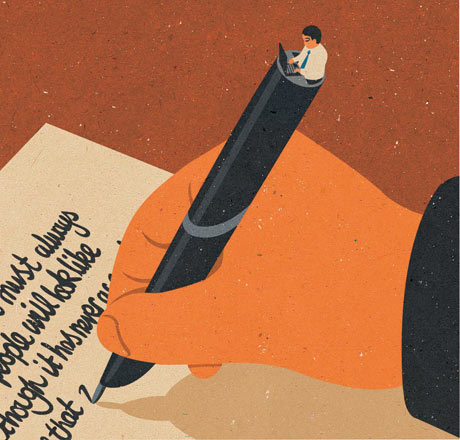
As a gadget-lover and stationery fetishist, I was naturally thrilled the other day to get to play with a state-of-the-art stationery gadget, a "smartpen" called the Livescribe Echo. (This must be how birdwatchers who are also real ale enthusiasts feel when they spot a white-billed diver on the roof of a pub serving Old Stoatwobbler.) The Echo writes, as pens do, and also records sound. But the stroke of genius – the part that prompted the New York Times recently to hail it as a potential revolution in education and beyond – lies in how it combines the two. Thanks to a camera in the tip, you can use it to take notes in a class or meeting and then, by tapping any word on the page, listen to what was being said at that moment. I haven't been as excited by a pen since those astronaut space pens, and I am, I should stress, the kind of person who gets excited by pens.
At almost £170, the Echo represents one pricey solution to a problem that's plagued humanity for centuries: what's the best way to take notes? (A cheaper text-plus-audio option is Pear Note at usefulfruit.com.) As challenges facing humanity go, it's not a sexy one: "A poet never takes notes," sniffed Robert Frost. "You never take notes in a love affair." But nor is it a specialist dilemma faced only by students or journalists: virtually any white-collar job requires it, unless you never take notes in meetings. In which case you should start, because at the moment nobody else believes you're paying attention.
You might think that working for a newspaper meant this was one skill I'd mastered, but you'd be wrong. Note-taking is an alarmingly complex cognitive affair, calling for summarising information while simultaneously listening for new incoming information; it also serves multiple roles, as a way to record things, understand things and, especially for students, remember things – one study suggests note-taking makes you seven times more likely to recall what you're learning. Handwriting suffers from what experts in the psychology of note-taking – yes, such people exist – call "low transcription fluency": the need to focus on the process gets in the way of exploring ideas. Audio recordings, though, arguably take too little effort, because they let you switch off your mind entirely, which highlights another curious truth: note-taking methods can be too easy. This is my stock defence of why I spend money on leather-bound notebooks: because they're expensive, they command a certain respect, making for thoughtful notes. When I use scrappy jotters, they tend to collect scrappy thoughts.
In the workplace, a more pressing hazard is that most people's meeting notes confuse two different kinds of information: mostly they're general points for future reference, but with specific to-dos, requiring urgent attention, mixed in. The blogger Michael Hyatt suggests drawing a tick-box on every page, and ticking it only after scouring that page for actionable items. Reportedly, Bill Gates takes notes similarly, dividing the paper into sections so that he can collect all the follow-up questions that occur to him in one place at the foot of the page. From which you can draw one of two conclusions. Either that such tricks are the key to Gates-like success – or that not even the founder of Microsoft prefers a sleek Windows netbook to the tried-and-tested technology of a pen and a piece of paper.
oliver.burkeman@theguardian.com

